De Nigeriaanse dichter en schrijver Chinua Achebe werd geboren op 16 november 1930 in Ogidi. Zie ook alle tags voor Chinua Achebe op dit blog.
Agostinho Neto
Agostinho, were you no more
Than the middle one favored by fortune
In children’s riddle; Kwame
Striding ahead to accost
Demons; behind you a laggard third
As yet unnamed, of twisted fingers?
No! Your secure strides
Were hard earned. Your feet
Learned their fierce balance
In violent slopes of humiliation;
Your delicate hands, patiently
Groomed for finest incisions,
Were commandeered brusquely to kill,
Your gentle voice to battle-cry.
Perhaps your family and friends
Knew a merry flash cracking the gloom
We see in pictures but I prefer
And will keep that sorrowful legend.
For I have seen how
Half a millennium of alien rape
And murder can stamp a smile
On the vacant face of the fool,
The sinister grin of Africa’s idiot-kings
Who oversee in obscene palaces of gold
The butchery of their own people.
Neto, I sing your passing, I,
Timid requisitioner of your vast
Armory’s most congenial supply.
What shall I sing? A dirge answering
The gloom? No, I will sing tearful songs
Of joy; I will celebrate
The man who rode a trinity
Of awesome fates to the cause
Of our trampled race!
Thou Healer, Soldier and Poet!
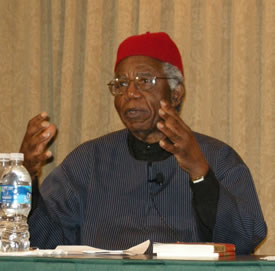
Chinua Achebe (Ogidi, 16 november 1930)
De Duitse schrijver, dichter en essayist Hugo Dittberner werd geboren op 16 november 1944 in Gieboldehausen. Zie ook alle tags voor Hugo Dittberner op dit blog.
Uit: Das See-Vokabularium
„Ein »He, du!« hörte ich im Radio rufen, aber Torges Läuten an der Haustür mußte ich überhört haben.
Denn nun arbeitete er schon an der alten Drehklingel und ließ gleich mehrmals das lange Ratschen mit dem folgenden kurzen Klingeln ertönen.
Als ich öffnete, stand er, noch immer »jung und prompt«, wie wir gesagt hatten, vor der Tür, obwohl
dreißig Jahre vergangen waren. Torge war der jüngere Bruder meines Studienfreundes Rainer Frederking. Eine Weile hatte er wie wir in Göttingen studiert und es damals nur schwer verwunden, daß er in unserer Freundschaft keine Rolle spielen sollte. Später hatte ich ihn noch ein, zwei Mal im Haus der Eltern an der See gesehen, als ich Rainer besuchte; und es schien nicht so, daß er Lust hätte, mit mir ins Gespräch zu kommen. So war ich gespannt, warum er mich, wie er telefonisch kurz angekündigt hatte, auf der Durchreise sprechen wollte.
Er kam gleich, als wartete der nächste Zug, zur Sache.
»Mir war immer klar, daß Rainer ein besonderer Mensch war!« betonte er: »Als Bruder kann ich das
wohl beurteilen!«
»Nun«, sagte ich, noch immer empfindlich bei seinen Übertreibungen, »ich will dir nicht widersprechen, Torge.«
Er erinnerte mich an den Tag, als Rainer nach Oldenburg gefahren war, um aus einer kanadischen
Altkleidersammlung die Elchlederjacke zu fischen, die er dann ewig trug, und wie sehr das ein Signal
war für alles, was kam.
Die Elchlederjacke war in der Tat Rainers besonderes Merkmal bei vielen unserer Unternehmungen
gewesen. Rainers »Wahrzeichen« hatten wir sie genannt. Ich sah ihn vor mir, und ich sah ihn vor mir,
wie er seinem Vater in dem Haus am Meer Rede und Antwort zu stehen hatte, ein erwachsener Sohn in den Zwanzigern! Wir waren am Meer gewesen und hatten über Rainers neues Lied gesprochen. Jünglinge, die am Meer wandern und Pfefferminz lutschen, Arme und Beine schlenkernd, hieß das beim zornigen Vater. Den hatte erbost, daß Rainer in dieser Elchjacke, in seinen Stiefeln und den lose darum schlenkernden gestreiften Hosen als ein Fremder in der Familie umherging, provokant wie ein Westernoder Freizeit-Held.“
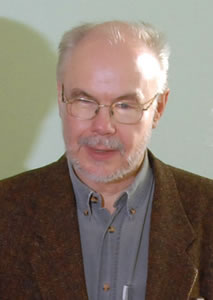
Hugo Dittberner (Gieboldehausen, 16 november 1944)
De Amerikaanse schrijfster Andrea Barrett werd geboren in Cape Cod, Massachusetts op 16 november 1954. Zie ook mijn blog van 16 november 2008 en ook mijn blog van 16 november 2009.
Uit: The Voyage of the Narwhal
„In tiny, skin-covered kayaks the strangers darted among the icebergs; their legs were hidden inside the boats, their arms extended by two-bladed paddles. Flash, flash: into the ocean and out again, water streaming silver from the blades. The paddles led to tight hooded jackets; the jackets merged into oval skirts connecting the men at their waists to the boats — like centaurs, Erasmus thought. Boat men, male boats. It was all a blur, he couldn’t see their faces.
Sean Hamilton tossed them bits of biscuit and Erasmus revised his first opinion: This was where the journey began, with this first sight of the arctic men he’d read about for so long. That these Greenlanders had traded with whalers for two centuries, been colonized by the Danes and converted by Moravian and Lutheran missionaries, made them less strange: but they were still new to him. On the first night in port, over a dinner of eider ducks at the huge-chimneyed home of the Danish inspector, he looked alternately at a bad engraving of four Greenlanders captured near Godthaab and brought to Copenhagen and, out the window next to the portrait, at the jumble of wooden huts and sealskin tents into which the mysterious strangers disappeared.“
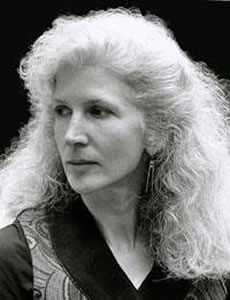
Andrea Barrett (Cape Cod, 16 november 1954)
De Franse schrijver Henri Charrière werd geboren op 16 november 1906 in Saint-Étienne-de-Lugdarès. Zie ook mijn blog van 16 november 2008.
Uit: Papillon (Vertaal door Walter B. Michaels)
“The prosecutor was Magistrate Pradel. He had the grim reputation of being the “number one” supplier to the guillotine and to the domestic and colonial prisons as well.
Pradel was the personification of public vengeance: the official accuser, without a shred of humanity. He represented law and justice, and he would do everything in his power to bend them to his will. His vulture’s eyes gazed intently down at me-down because he sat above me, and down also because of his great height. He was at least six foot three-and he carried it with arrogance. He kept on his red cloak but placed his cap in front of him and braced himself with hands as big as paddles. A gold band indicated he was married, and on his little finger he wore a ring made from a highly polished horseshoe nail.
Leaning forward a little, the better to dominate me, he seemed to be saying, “Look, my fun-loving friend, if you think you can get away from me, you’re much mistaken. You don’t know it, but my hands are really talons and they’re about to tear you to pieces. And if I’m feared by the lawyers, it’s because I never allow my prey to escape.
“It’s none of my business whether you’re guilty or innocent; my job is to use everything that’s available against you: your bohemian life in Montmartre, the testimony extorted from the witnesses by the police, the testimony of the police themselves. With the disgusting swill the investigator has collected, I must make you seem so repulsive that the jury will cast you out of the society of men.”
Was I dreaming or was he really speaking to me? Either way I was deeply impressed by this “devourer of men.”
“Don’t try to resist, prisoner. Above all, don’t try to defend yourself. I’m going to send you down the road of the condemned anyway. And I trust you have no faith in the jury. Have no illusions in that quarter. Those twelve know nothing of life.“
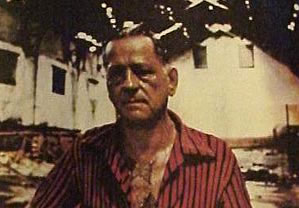
Henri Charrière (16 november 1906 – 29 juli 1973)
De IJslandse dichter en natuurwetenschapper Jónas Hallgrímsson werd geboren op 16 november 1807 in Öxnadalur. Zie ook mijn blog van 16 november 2008.
At an Old Grave, 1841
Hardship! though your unhappy son
lies here secure in nature’s keeping,
clad in eternal night and sleeping —
his soul’s enduring weal is won.
Glazed is your eye — how free from guile,
how kind in my young estimation!
It made me sigh with admiration,
seeing the triumph of your smile!
Stilled are your thin, deft hands (how high
their art had been! our envy lingers),
agile as winsome maidens’ fingers
laying white linen out to dry.
Bide here, my old friend, in your bed
until the golden tones of seven
trumpets remold the earth and heaven!
Iceland was cold, oh Kjærnested.
Artistry knows her cue to cry:
wintertime snows lay waste the flowers,
waiting to close their tale of hours —
the reddest rose is first to die.
Vertaald door Dick Ringler
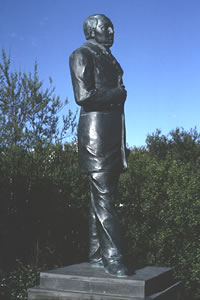
Jónas Hallgrímsson (16 november 1807 – 26 mei 1845)
Standbeeld van Einar Jónsson in Reykjavik
De Duitse dichter en schrijver Max Zimmeringwerd geboren op 16 november 1909 in Pirna (Sachsen). Zie ook mijn blog van 16 november 2006.
Klopfen an der Tür
Es klopfte an der Tür, ein zages Klopfen,
als wenn der Wind ein Blatt ans Fenster schnellt,
wie ein verirrter Sonnenregentropfen,
der dir im Garten auf die Zeitung fällt.
So zögernd war der Laut, der mich gerufen –
so zögernd war der Blick, der mich empfing:
Ein kleines Mädchen nahe an den Stufen,
schon fluchtbereit, ein blasses, schmales Ding.
Erst auf die dritte Frage, sanft gesprochen,
bat sie mich um Wasser, da sie durstig sei.
Mir war’s, als hört ihr Herz ich leise pochen.
“Und hungrig?” fragte ich wie nebenbei.
War es Verachtung, war’s ein Mitleidsschimmer
im Kinderauge, das mich musterrnd maß?
“Zu trinken nur, denn hungrig bin ich immer…”
Sie leerte gierig das gereichte Glas.
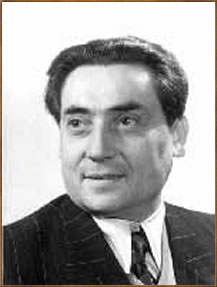
Max Zimmering (16 november 1909 – 15 september 1973)
Zie voor onderstaande schrijvers ook mijn blog van 16 november 2008.
De Duitse schrijfster Birgitta Arens werd geboren op 16 november 1948 in Oeventrop.
